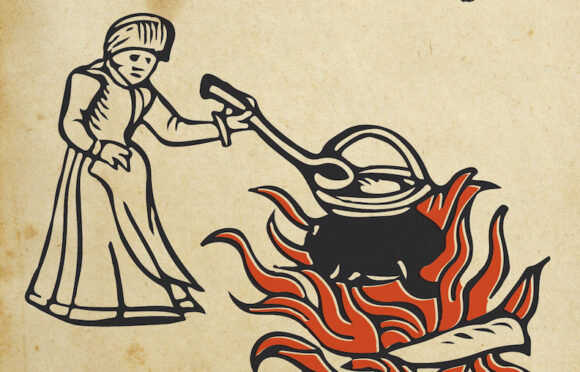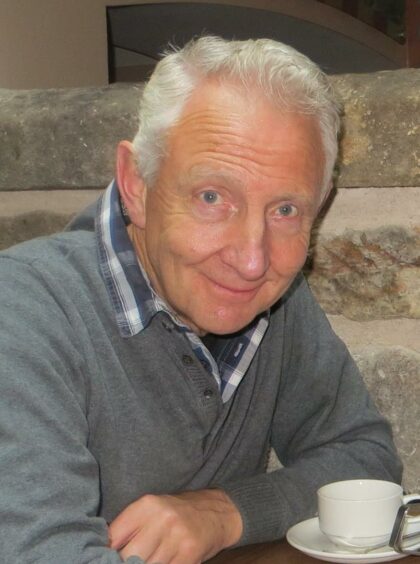
The tragic tale of an Ayrshire woman burned as a witch in the 16th century is at the centre of a campaign to ensure the history and heritage of Dalry isn’t bypassed by a recently-opened road.
A group of women from the town hope to install a permanent art piece next to the A737 in honour of Bessie Dunlop, who was one of the thousands persecuted for witchcraft in Scotland.
The Bypass Art group have already brought the community together for a short film celebrating Dalry’s past, which was premiered last month.
Julie Wales, chair of the group, said: “Dalry is a lovely town to live in but we thought people might bypass it. We have got such a lot of history which deserves to be known.
“With Bessie, it was a case of all the injustices she had suffered. In all the things they said she did they couldn’t actually come up with something that said she harmed anyone. She was a good person.”
Dunlop relied on old superstitions, traditional folk medicine and charms for helping people in her role as a midwife and healer.
But in an age where hysteria around witchcraft was at its peak, she aroused suspicious and found herself reported by a neighbour, arrested and taken to Edinburgh where she was tortured until she confessed.
Under duress, she told the trial of her encounters with the spirit of Thom Reid, a former barony officer from Dalry who had died at the Battle of Pinkie against the English in 1547.
She was found guilty of sorcery, witchcraft and incantation, among other charges, at the High Court of Judiciary on November 8 1576, sentenced to be burned at the stake.
“For a wee woman from Dalry, she was well documented,” Wales said. “You can relate what happened to Bessie to a lot of instances in modern day times, like when one person jumps on a bandwagon a lot of others do and pretty soon people don’t know what’s fact and what’s fiction.
“We’re wiser, more knowledgeable now. We have a herbalist in Dalry who is an ex-NHS nurse. There’s the difference in the times.”
The group has plenty of ideas for what they want the art installation to be. They hope to get the funds in place to bring in professional help to determine the costs involved and work on a design.
It’s a project that’s caught the attention of the local community, who have already been involved in the efforts to tell their history.
A short film based on a poem by John Hodgart, called The Hilltap Toon, brought together 150 members of the community, including school children, locals and even the town’s football team Dalry Thistle.
The final scenes of the film were shot just before the pandemic hit, so it’s not until late last month that it was screened for the first time.
Hodgart, who wrote 64 verses on Dalry through the ages, was delighted to see the story of his town and Dunlop brought to life.
“I’ve never heard of a community getting involved like that reciting a poem about their community’s history and story,” he said. “It’s a folk history in the language of Ayrshire Scots, the one I grew up with in Dalry.
“I think it really sparked off an enthusiasm for being involved in this. It’s a great medley of voices of all ages, who brought their own character, humour, personality to each bit they delivered. It’s a wonderful record of the community now as well, which has made it very special to me.
“There’s folk who were at school with me, and people I taught. Some of the oldest and youngest folk in the community.
“I found it very moving, I could hardly put words together after watching it. It’s in a way a love poem to a place.”
The retired teacher first heard of Dunlop as a teenager in his granny’s house, where his elderly aunts spoke of bottling water at a well once frequented by the woman who’d become known as the witch of Dalry.
The fascination stuck with him, leading him to write about her in a play, books and the new poem.
“Bessie’s been with me for a long long time,” he said. “Her case is one of the earliest and most extraordinary cases on record because it was recorded in great detail, all the things she confessed to – or was persuaded to say under extreme torture.”
A pardon. An apology. A memorial: Campaigners urge pardoning for Scots women executed for witchcraft
The scholar Robert Pitcairn compiled Dunlop’s case in his volumes of Ancient Criminal Trials in Scotland, and Sir Walter Scott wrote of her in his study of the supernatural, Letters on Demonology and Witchcraft.
“It’s a classic case of a male hierarchy wanting to suppress the power that women had that they feared,” Hodgart added. “Misogyny was one of the big drivers behind the witch prosecutions and that raged over Europe for a couple of centuries, Scotland by no means the worst. Estimates vary hugely about how many were burned in Europe – the records just don’t survive.
“The story is so relevant to the modern world today. Scapegoating and persecution of someone who is a threat to the order of the time – these things are still going on.”
The new focus on the tale of Dunlop comes at a time where the Witches of Scotland campaign, founded by Claire Mitchell QC and Zoe Venditozzi, seeks an official pardon for those who were victims between 1563 and 1736, when the Witchcraft Act was law.
Venditozzi said: “The witchcraft trials are never something we learned about – or teach – at school, but it’s such a huge topic. We are trying to change the past, but the reality is people are still being accused of witchcraft around the globe. It’s a historical issue but one so relevant to today, too.”

Enjoy the convenience of having The Sunday Post delivered as a digital ePaper straight to your smartphone, tablet or computer.
Subscribe for only £5.49 a month and enjoy all the benefits of the printed paper as a digital replica.
Subscribe © Supplied
© Supplied © Supplied
© Supplied